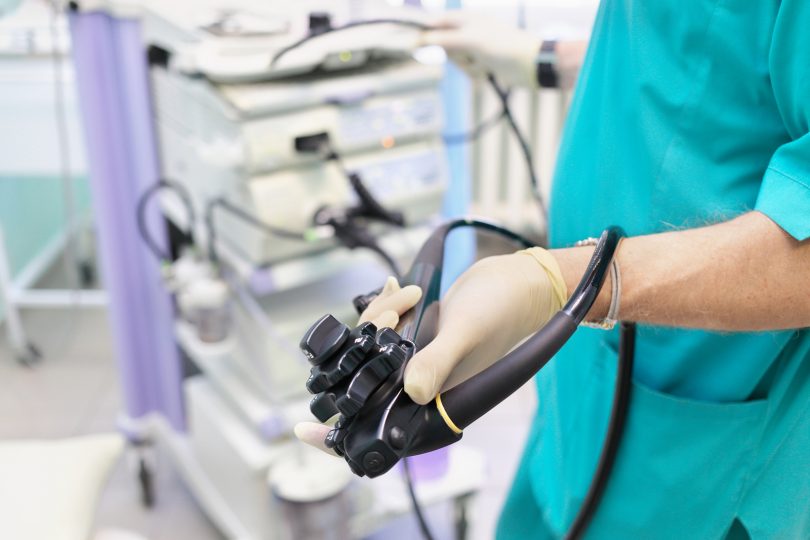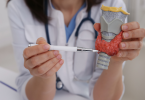Let’s be honest, most everybody shares the same reaction to learning they have to undergo a colonoscopy. 😬
However, one of the newest members of the Digestive Health Center at Augusta University Health has made it his mission to turn anxiety, fear and stress about the procedure into peace, calmness and relaxation about the experience.
“Yes, preparing for a colonoscopy can be a complicated process for some,” said Dr. Kenneth Vega, chief of Gastroenterology and co-director of the Digestive Health Center. “But, there are strategies I share with all my patients that can make it a much better experience.”
According to the American Cancer Society, colorectal cancer is the third most common cancer diagnosed in the United States for both men and women and the second most common cause of cancer death. But, did you know that undergoing a colonoscopy allows doctors to detect changes in the colon before a person can develop cancer?
“As we are moving through a patient’s colon, we are looking for polyps,” Vega said. “These are bumps, some large, some small, we find inside the colon. If not removed, they can transition into colorectal cancer.”
What kind of colonoscopy should I get?
You’re at low or average risk for colon cancer if you’ve never had colorectal polyps or cancer…
National guidelines recommend colonoscopies at age 50. For African Americans, the recommended screening age starts at 45.
Recommended tests include:
- a colonoscopy every 10 years
- an annual Fecal Immunochemical Test
Other options include:
- FIT-fecal DNA (also known as Cologuard®) every 3 years
- CT colonography every 5 years
- Flexible sigmoidoscopy every 5 to 10 years
If you have a family history of colon polyps or colon cancer…
Your primary care physician may recommend a colonoscopy at age 40 or younger. It’s important to discuss your family history with your primary care doctor and determine the best year to start screenings and the frequency at which you should repeat them. If you have a family history of either colon cancer or polyps then the test should occur every five years.
Recommended tests include:
- a colonoscopy. It is the best test for identifying precancerous colon polyps.
If you have a history of colon polyps or cancer…
Your primary care physician will determine the best follow-up care with a colonoscopy. According to the American Society for Gastrointestinal Endoscopy, a colonoscopy is the only effective test for polyp follow-up. Based on the type, number and size of the precancerous polyps, your doctor will determine the next steps of diagnosis and treatment.
More screenings mean more lives saved
According to the American Cancer Society, colonoscopies are one reason the number of men and women dying from colorectal cancer has decreased for the last several decades. For those who had colorectal cancer at the time of their colonoscopy, the procedure allows doctors to find the cancer at earlier stages, increasing a patient’s chance of living a longer, healthier life.
“As a gastroenterologist, I’ve been performing colonoscopies for over 25 years,” Vega said. “Also, I have undergone the procedure myself twice now. Having that personal experience allows me to give my patients insight into what to expect from preparing for the procedure to the recovery after they arrive home.”
Vega said his first tactic for a better colonoscopy experience begins with the laxative formula patients must drink to clean out their colon. According to Vega, patients should make the laxative as cold as possible before drinking. Also, find a favorite beverage to drink before and after to help with the after taste. Patients should start drinking it around 4 p.m. the day before their procedure. You’ll drink it every 20 minutes. Starting the process at 4 p.m. will mean you’ll finish between 9 p.m. and 10 p.m. that evening.
“Following this schedule means you should be finished emptying your colon no later than midnight,” Vega said. “This will allow patients to get a good night’s sleep for their procedure the following morning. A colonoscopy is a much more enjoyable experience if you are rested.”
For Vega, humor is another important tactic for preparing for a colonoscopy.
What to expect from your colonoscopy
“I tell my patients to invest in good reading material,” he said. “Also, buy soft toilet paper and make sure you angle the TV so you can enjoy your favorite movie or show while you ‘work.’”
The procedure itself can take between 30 minutes to an hour. After the patient is sedated, a doctor begins by inserting the scope into the rectum, moving it through the four sections of the colon until it reaches the cecum, which connects to the end of the small intestine. Once it reaches this area, the doctor begins removing the scope while looking for and removing any polyps.
“Drinking the laxative formula and having a clean colon allows me to not miss any polyps during the procedure,” Vega said.
To show how important having a colonoscopy can be for preventing colorectal cancer, Vega shared a story of a patient who kept putting off the procedure.
“I did that person’s procedure in 2002, when the patient was 56-years-old,” he said. “In all, I found 30 polyps during my examination of the colon. Four of those were large and aggressive enough to be transitioning into cancer.”
Vega said he talked with the patient about having surgery to remove the section of the colon where those aggressive polyps were found.
“Now, he sends me birthday and holiday greetings all these years later,” Vega said. “There’s nothing better than taking out something you know would have turned into something bad. Knowing you came at the right time and for me to be able to help you in the best possible way is very satisfying.”





